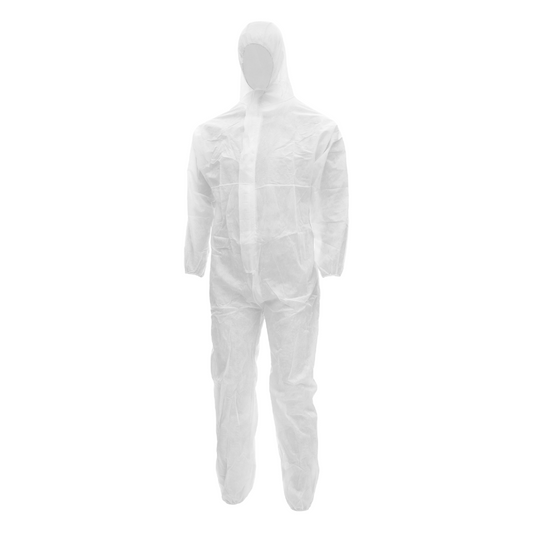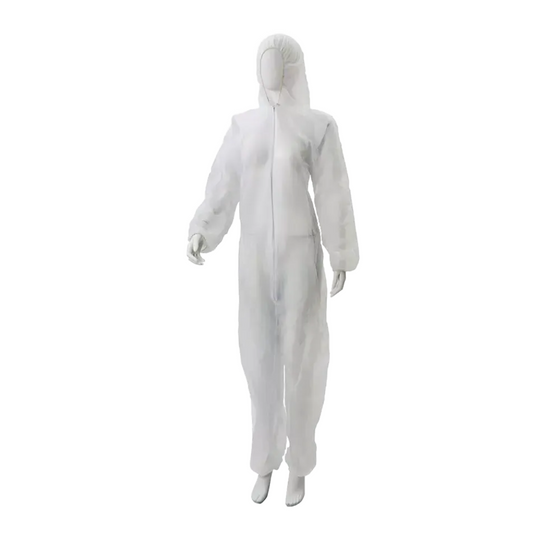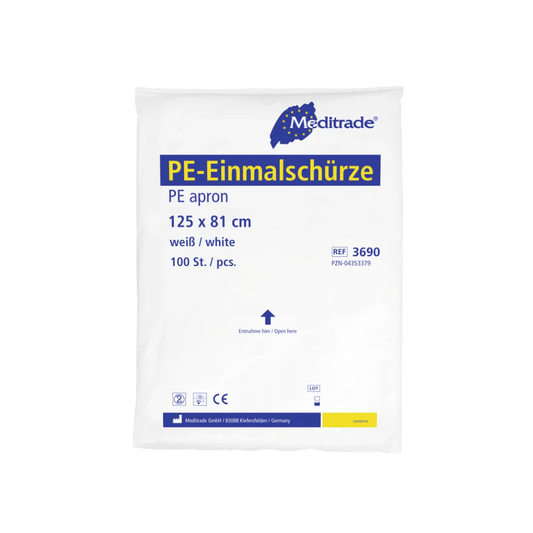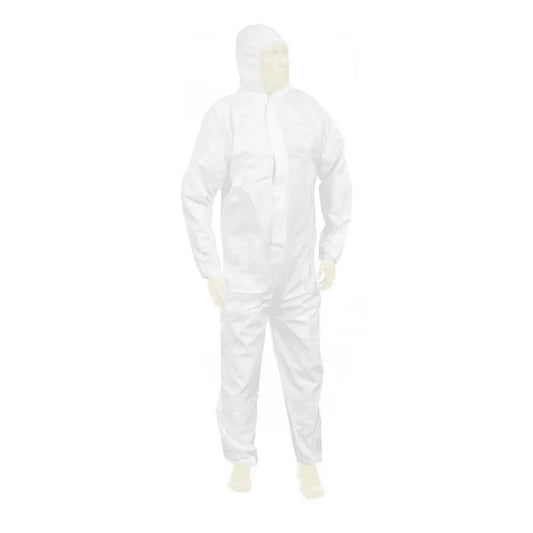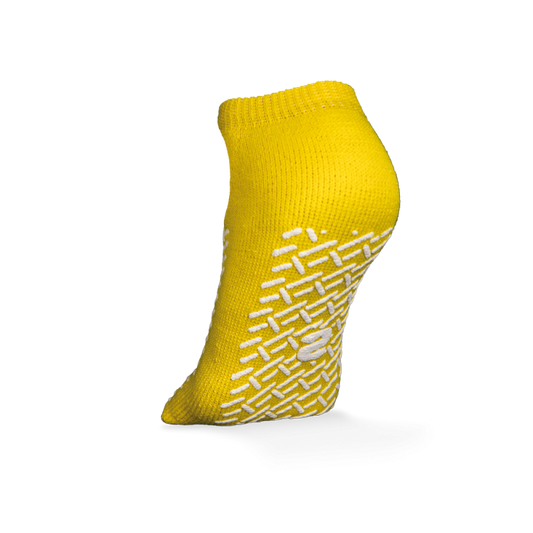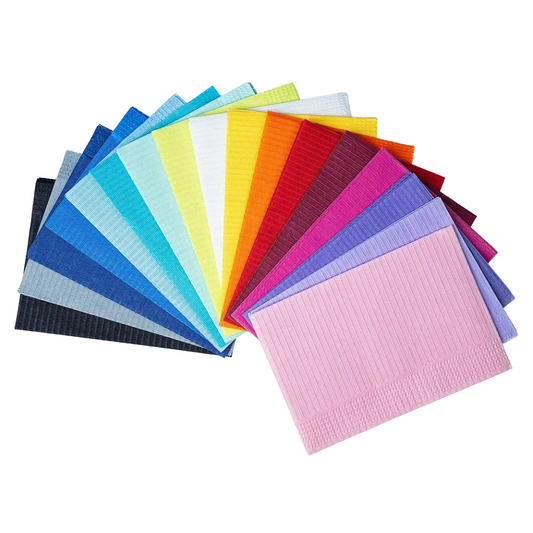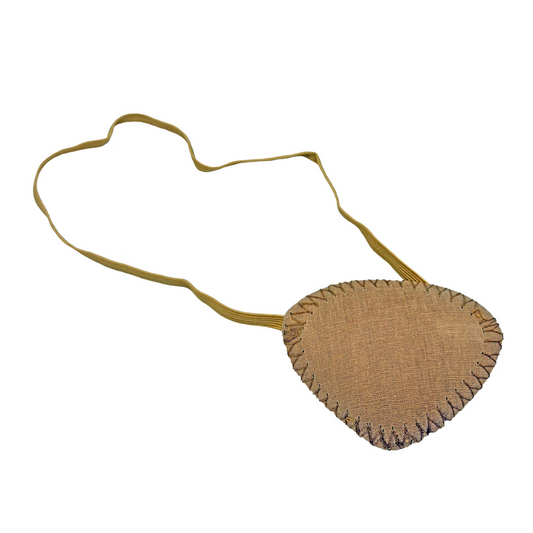-
 Up to 35% offSold outVendor:AMPri Handelsgesellschaft mbH
Up to 35% offSold outVendor:AMPri Handelsgesellschaft mbHAmpri Med-Comfort disposable anti-slip socks
Regular price From 0,81 €Sale price From 0,81 € Regular priceUnit price per1,23 € -

 Up to 35% offVendor:AS Arbeitsschutz GmbH
Up to 35% offVendor:AS Arbeitsschutz GmbHNitras PP proto overall white polypropylene breathable hooded sleeves and leg closures
Regular price From 0,86 €Sale price From 0,86 € Regular priceUnit price per1,20 € -

 Up to 39% offVendor:AMPri Handelsgesellschaft mbH
Up to 39% offVendor:AMPri Handelsgesellschaft mbHAmpri Med-Comfort PP disposable overall with zipper and hood, different sizes/colors
Regular price From 0,98 €Sale price From 0,98 € Regular priceUnit price per1,50 € -

 Vendor:Meditrade GmbH
Vendor:Meditrade GmbHMeditrade PE THEINE apron (white) - 100 pieces
Regular price From 7,33 €Sale price From 7,33 € Regular priceUnit price per7,33 € -
 Vendor:Meditrade GmbH
Vendor:Meditrade GmbHMeditrade Protection napkind - 100 pieces | Pack (100 pieces)
Regular price 7,97 €Sale price 7,97 € Regular priceUnit price per7,97 € -

 Up to 74% offVendor:Meditrade GmbH
Up to 74% offVendor:Meditrade GmbHMeditrade Beesana® PP/PE-Kittel 26g, 10-pack
Regular price 2,08 €Sale price 2,08 € Regular priceUnit price per8,00 € -
 Up to 39% offVendor:Meditrade GmbH
Up to 39% offVendor:Meditrade GmbHMeditrade Suavel® Yeti protective suit
Regular price From 2,12 €Sale price From 2,12 € Regular priceUnit price per3,47 € -

 Vendor:Paul Hartmann AG
Vendor:Paul Hartmann AGVALA® FIT BAND THE THE POSCIATION, 3-layer-100 pieces | Pack (100 pieces)
Only 23 leftRegular price 9,61 €Sale price 9,61 € Regular priceUnit price per9,61 € -

 Vendor:AMPri Handelsgesellschaft mbH
Vendor:AMPri Handelsgesellschaft mbHECO-PLUS anti-slip disposable socks coated on both sides
Regular price From 0,78 €Sale price From 0,78 € Regular priceUnit price per0,78 € -

 Up to 35% offVendor:Paul Hartmann AG
Up to 35% offVendor:Paul Hartmann AGHartmann Foliodress® gown Protect sterile surgical gown
Regular price From 2,26 €Sale price From 2,26 € Regular priceUnit price per3,19 € -
 Up to 10% offVendor:Meditrade GmbH
Up to 10% offVendor:Meditrade GmbHMeditrade PE -Einchürzen in white, blocked - 50 pieces | Pack (50 pieces)
Regular price 4,75 €Sale price 4,75 € Regular priceUnit price per5,28 € -

 Up to 35% offVendor:AMPri Handelsgesellschaft mbH
Up to 35% offVendor:AMPri Handelsgesellschaft mbHAmpri Dental disposable patient napkins 33 x 45 cm, different colors | Cardboard (4 packs)
Regular price From 17,13 €Sale price From 17,13 € Regular priceUnit price per25,46 € -

 Up to 35% offVendor:AMPri Handelsgesellschaft mbH
Up to 35% offVendor:AMPri Handelsgesellschaft mbHAmpri Med-Comfort PP Vlies visitor coats, different sizes/colors
Regular price From 0,44 €Sale price From 0,44 € Regular priceUnit price per0,67 € -
 Up to 4% offVendor:Paul Hartmann AG
Up to 4% offVendor:Paul Hartmann AGVala® Comfort Apron disposable aprons - 100 pieces | Pack (100 pieces)
Only 8 leftRegular price 9,48 €Sale price 9,48 € Regular priceUnit price per9,88 € -

 Vendor:Holthaus Medical GmbH & Co. KG
Vendor:Holthaus Medical GmbH & Co. KGHolthaus Ypsimed eye flap, with rubber band
Only 15 leftRegular price 1,80 €Sale price 1,80 € Regular priceUnit price per1,80 €
Further categories
Protective clothing is special equipment designed to protect the wearer from health risks and hazards in the workplace. It includes a wide range of products such as disposable coveralls, protective gowns, gloves, respiratory masks, and safety goggles. This clothing is designed to protect both the wearer and the environment from harmful influences such as chemicals, biological hazards, or mechanical risks.
When do I need protective clothing?
Protective clothing is essential in many professions, especially when working in hazardous environments. This includes the chemical and pharmaceutical industries, healthcare, laboratories, as well as construction and manufacturing industries. Wherever there is contact with harmful substances, infectious agents, or dangerous machinery, protective clothing is required to prevent injuries and health damage.
What types of protective clothing are there?
There are various types of protective clothing, each designed for specific applications:
- Protective suit: Provides protection against chemicals, dust, and other particles, ideal for use in industrial environments.
- Protective gown: Specifically for healthcare, to protect patients and staff from infections.
- Disposable gloves: Made from materials such as nitrile, vinyl, and vitrile, providing protection against chemical, biological, and mechanical hazards.
- Respiratory masks: Protect against inhalation hazards such as dust, fumes, and aerosols.
- Head protection hoods: Reduce the risk of contamination. They are often used in medical facilities, laboratories, and the food industry to comply with hygiene regulations and prevent the spread of germs.
Advantages and Benefits of Protective Clothing
The use of protective clothing offers numerous advantages. It minimizes the risk of injuries and health issues by creating a barrier between the wearer and hazardous substances or environments. Additionally, it contributes to compliance with occupational safety regulations and also protects the environment from contamination, which is particularly important in the food industry and healthcare.
Protective clothing is an essential component of personal protective equipment (PPE) and indispensable for workplace safety. It offers comprehensive protection, enhances safety, and ensures compliance with hygiene standards in demanding work environments. Discover the extensive range of protective clothing at Altruan and find the right equipment for your specific needs.
Find many more products in the Altruan online shop.





